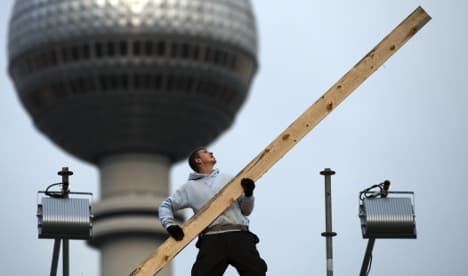Unemployment drops as retail sales rebound

Official data on Tuesday showed German unemployment falling sharply and retail sales picking up, as Europe's biggest economy pushed on despite the eurozone financial crisis.
The unemployment rate fell to 7.7 percent of the workforce in May, the lowest its been since December 2008, from 8.1 percent in April.
"In these difficult times, the labour market has provided good news," Labour Minister Ursula von der Leyen said in Berlin, before noting that repercussions of the economic crisis last year "have remained limited."
Across the 16-nation eurozone however, unemployment reached a record of 10.1 percent in April, with almost 16 million people out of work, the European Union said in Brussels.
Germany had more good news to report meanwhile, as the national statistics office said shoppers headed back to the high street in April, pushing up retail sales for the first time this year.
They gained a seasonally-adjusted 1.0 percent from March, in line with analysts' forecasts, the Destatis office said.
Export-orientated Germany has been pressured by European Union neighbours to boost domestic consumption and help those who do not manage to achieve Berlin's constant trade surpluses.
The end of a harsh winter along with factors such as the German government's short-work programme and a pick-up in crucial exports have helped the country weather the storm battering peripheral eurozone countries like Greece, Portugal and Spain.
Berlin's latest unemployment figure was the lowest May reading since 1992 and the 11th monthly decline in a row.
The seasonally-adjusted number of jobseekers fell by 45,000 or nearly three times more than a forecast of 17,500 compiled by Dow Jones Newswires.
"Successful labour market reforms, the government's famous crisis tool of short-work schemes and companies' prudence have made the labour market the bright spot of the recession," ING senior economist Carsten Brzeski noted.
German officials have subsidised shorter working hours so companies did not have to lay off as many workers amid the country's worst post-war recession, and can be brought back to full-time status as orders for German wares bounce back.
That means fewer new workers are likely to be hired now, but also that "the latest level of joblessness is now only slightly higher than at the end of the previous economic boom," noted IHS Global Insight senior economist Timo Klein.
"It still has to be called a jobs miracle that the largest post-war recession by far has only led to a short-lived spike in joblessness," he said.
UniCredit economist Alexander Koch said: "The recent substantial drop reflects a true rise in demand for labour," and added that prospects for the jobs market "continue to remain favorable for the time being."
The biggest question mark is whether efforts to redress government finances and uncertainty generated by the eurozone's fiscal crisis will weigh on growth later this year, economists said.
Comments
See Also
The unemployment rate fell to 7.7 percent of the workforce in May, the lowest its been since December 2008, from 8.1 percent in April.
"In these difficult times, the labour market has provided good news," Labour Minister Ursula von der Leyen said in Berlin, before noting that repercussions of the economic crisis last year "have remained limited."
Across the 16-nation eurozone however, unemployment reached a record of 10.1 percent in April, with almost 16 million people out of work, the European Union said in Brussels.
Germany had more good news to report meanwhile, as the national statistics office said shoppers headed back to the high street in April, pushing up retail sales for the first time this year.
They gained a seasonally-adjusted 1.0 percent from March, in line with analysts' forecasts, the Destatis office said.
Export-orientated Germany has been pressured by European Union neighbours to boost domestic consumption and help those who do not manage to achieve Berlin's constant trade surpluses.
The end of a harsh winter along with factors such as the German government's short-work programme and a pick-up in crucial exports have helped the country weather the storm battering peripheral eurozone countries like Greece, Portugal and Spain.
Berlin's latest unemployment figure was the lowest May reading since 1992 and the 11th monthly decline in a row.
The seasonally-adjusted number of jobseekers fell by 45,000 or nearly three times more than a forecast of 17,500 compiled by Dow Jones Newswires.
"Successful labour market reforms, the government's famous crisis tool of short-work schemes and companies' prudence have made the labour market the bright spot of the recession," ING senior economist Carsten Brzeski noted.
German officials have subsidised shorter working hours so companies did not have to lay off as many workers amid the country's worst post-war recession, and can be brought back to full-time status as orders for German wares bounce back.
That means fewer new workers are likely to be hired now, but also that "the latest level of joblessness is now only slightly higher than at the end of the previous economic boom," noted IHS Global Insight senior economist Timo Klein.
"It still has to be called a jobs miracle that the largest post-war recession by far has only led to a short-lived spike in joblessness," he said.
UniCredit economist Alexander Koch said: "The recent substantial drop reflects a true rise in demand for labour," and added that prospects for the jobs market "continue to remain favorable for the time being."
The biggest question mark is whether efforts to redress government finances and uncertainty generated by the eurozone's fiscal crisis will weigh on growth later this year, economists said.
Join the conversation in our comments section below. Share your own views and experience and if you have a question or suggestion for our journalists then email us at [email protected].
Please keep comments civil, constructive and on topic – and make sure to read our terms of use before getting involved.
Please log in here to leave a comment.